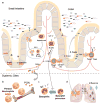Innate immune recognition of the microbiota promotes host-microbial symbiosis
- PMID: 23778794
- PMCID: PMC4109969
- DOI: 10.1038/ni.2635
Innate immune recognition of the microbiota promotes host-microbial symbiosis
Abstract
Pattern-recognition receptors (PRRs) are traditionally known to sense microbial molecules during infection to initiate inflammatory responses. However, ligands for PRRs are not exclusive to pathogens and are abundantly produced by the resident microbiota during normal colonization. Mechanism(s) that underlie this paradox have remained unclear. Recent studies reveal that gut bacterial ligands from the microbiota signal through PRRs to promote development of host tissue and the immune system, and protection from disease. Evidence from both invertebrate and vertebrate models reveals that innate immune receptors are required to promote long-term colonization by the microbiota. This emerging perspective challenges current models in immunology and suggests that PRRs may have evolved, in part, to mediate the bidirectional cross-talk between microbial symbionts and their hosts.
Figures



References
-
- Janeway CA., Jr Approaching the asymptote? Evolution revolution in immunology. Cold Spring Harb Symp Quant Biol. 1989;54(Pt 1):1–13. - PubMed
-
- Beutler B. Inferences, questions and possibilities in Toll-like receptor signalling. Nature. 2004;430:257–263. - PubMed
-
- Akira S, Uematsu S, Takeuchi O. Pathogen recognition and innate immunity. Cell. 2006;124:783–801. - PubMed
-
- Meylan E, Tschopp J, Karin M. Intracellular pattern recognition receptors in the host response. Nature. 2006;442:39–44. - PubMed
-
- Kawai T, Akira S. The role of pattern-recognition receptors in innate immunity: update on Toll-like receptors. Nat Immunol. 2010;11:373–384. - PubMed
Publication types
MeSH terms
Substances
Grants and funding
LinkOut - more resources
Full Text Sources
Other Literature Sources
Medical

